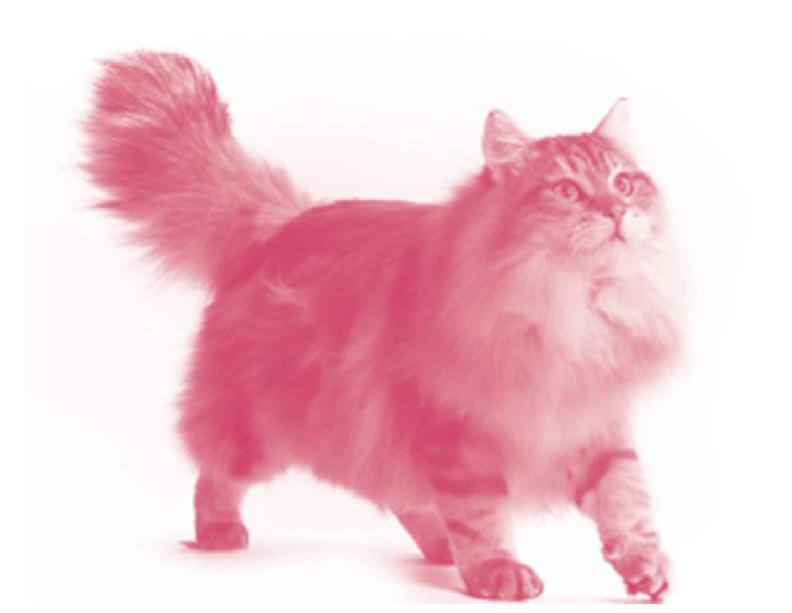《罗克斯维尔火车站的猫》(节选七)
2021-04-08琼·克雷格黑德·乔治
琼·克雷格黑德·乔治


“No cats, period. Now, do your chores,” she ordered.
The cat argument always ended this way. Alice Dibber, Mikes foster mother, really disliked cats.
Mike rolled up his sleeves and began washing the pile of dishes and pans in the big steel sink. This was one of the chores he had to do for Mrs. Dibber. As he worked, he longed for that spunky Rachet. He remembered how warm the tiger cat had felt in his hands. Somehow she filled an empty space in him. He felt she shared that emotion with him. Rachet, he fantasized, was an orphan, too.
And wonder of wonders, he realized Rachet was teaching him how to speak “cat.”
By watching the Roxville cats and Rachet every day, he was beginning to understand why they held their tails as they did—rank and mood. Why their pupils widened and narrowed—anger and fear when they were wide, and satisfaction when they were narrow. Their ears also talked—back for fear, forward for friendship, and against their heads and down for aggression. But it was mostly their independence that pleased Mike. He admired that.
What is more, he had sensed that Rachet, too, had known a miserable earlier life. Maybe they could make up for it if they had each other.
He wanted her badly. He would figure out how to have her without making Mrs. Dibber mad at him.
When Mr. Dibber died two years ago, Mrs. Dibber was forced to close off the tower and three upstairs bedrooms to save heat. She had moved down to the parlor, where the elegant furniture and the beautifully wrought Franklin coal stove stood. Mike lived in the upstairs servants room, impatiently waiting for the four years to pass until he was eighteen and independent… like Rachet.
He missed Mr. Dibber. He had been a kindly man and jolly. The two of them had been good friends. They had hung out on the docks together admiring the yachts that were moored there and eating ice-cream cones and hot dogs, which Mrs. Dibber never allowed in the house. They often went out on Mr. Dibbers boats. He had taught Mike how to keep those boats perfect by caulking, sanding, and painting them. Boats were things of beauty, Mr. Dibber had said, and a path to great adventures.
Mr. Dibber had also taken him to basketball games because he knew Mike liked basketball. Now he was gone. Mike wiped his eyes with his sleeve and thought of Rachet.
He smiled as he rinsed the dishes and pans, thinking what fun he had had with a cat when he was younger. His birth dad had brought home a tabby cat when Mike was seven.
She used to sit on his books while he did his homework, he recalled. To keep her busy and out of trouble, he had put a paper bag on the desk, and in she went. Cats have to go into paper bags, Mike didnt know why. But she would fuss around in it until he got his homework done. She was wonderful.
“不能養猫,就这样。现在,做家务去。”她命令迈克。
有关养猫与否的争论总是以这样的方式结束。爱丽丝·迪波是迈克的养母,很不喜欢猫。
迈克卷起袖子,开始洗那些放在巨大钢质洗碗池里的一大堆碟子、盘子和锅。这是他必须为迪波夫人做的家务之一。他一边洗碗,一边想着那活泼大胆的拉齐特。他想起那只虎斑猫在手里感觉是多么温暖。不知为何那只猫填补了他心里的一处空缺。他能感觉到猫咪也有同感。他猜想,拉齐特也是一个孤儿。
最最奇妙的是他觉得拉齐特在教会他如何讲“猫语”。
通过每天观察罗克斯维尔火车站的猫咪以及拉齐特,迈克开始理解它们尾巴动作的意义了——那标志着地位和情绪。还有它们的瞳孔为什么会扩大和变窄——生气和害怕的时候就变大,心满意足的时候就变窄。它们的耳朵也会讲话——耳朵往后伏是害怕,往前伸是友谊,贴着脑袋往下是要攻击。不过,让迈克喜爱的是它们独立不羁。迈克欣赏这一点。
还有一点,迈克觉察到拉齐特也有一段痛苦的早期生活经历。如果他们能够拥有彼此,也许会弥补彼此的遗憾。
迈克迫切地想得到拉齐特。他要想出一个办法得到她,同时又不会惹得迪波夫人生他的气。
两年前,迪波先生去世了。为了节省供热,迪波夫人被迫关闭了塔楼和三个楼上卧室。她自己搬到了客厅来住。客厅里有典雅的家具和铸造精美的富兰克林煤炭炉。迈克住在楼上的仆人房间,焦躁地等待着再过四年,自己十八岁,然后就可以独立了……像拉齐特那样。
迈克怀念迪波先生。迪波先生是一个和蔼乐天的人。他们俩是很好的朋友。他们一起在码头上闲逛,欣赏停泊在那里的游艇,一起吃冰淇淋甜筒和热狗。迪波夫人不让他们在家里吃这些。他们经常乘坐迪波先生的船出门。迪波先生教会了迈克如何通过填嵌、打磨和油漆使得船只保持完美的状态。迪波先生说过,船只是美妙的东西,可以凭借它们进行伟大的冒险。
迪波先生还经常带迈克去看篮球赛,因为他知道迈克喜欢篮球。现在迪波先生已经去世。迈克用袖子擦了一下眼睛,想起了拉齐特。
迈克一边洗涮锅碗瓢盆,一边微笑,因为他想起了小时候有一只猫的快乐时光。迈克七岁的时候,他的生父曾经带回家一只虎斑猫。
迈克回忆起来,他做作业的时候,虎斑猫就坐在他的书本上。为了让猫咪有事儿干不捣乱,迈克在书桌上放了一个纸袋子,猫咪就钻了进去。猫咪就爱钻纸袋子,迈克不知道为啥。但猫咪总是在纸袋子里忙来忙去,直到他做完作业。那只虎斑猫棒极了。
